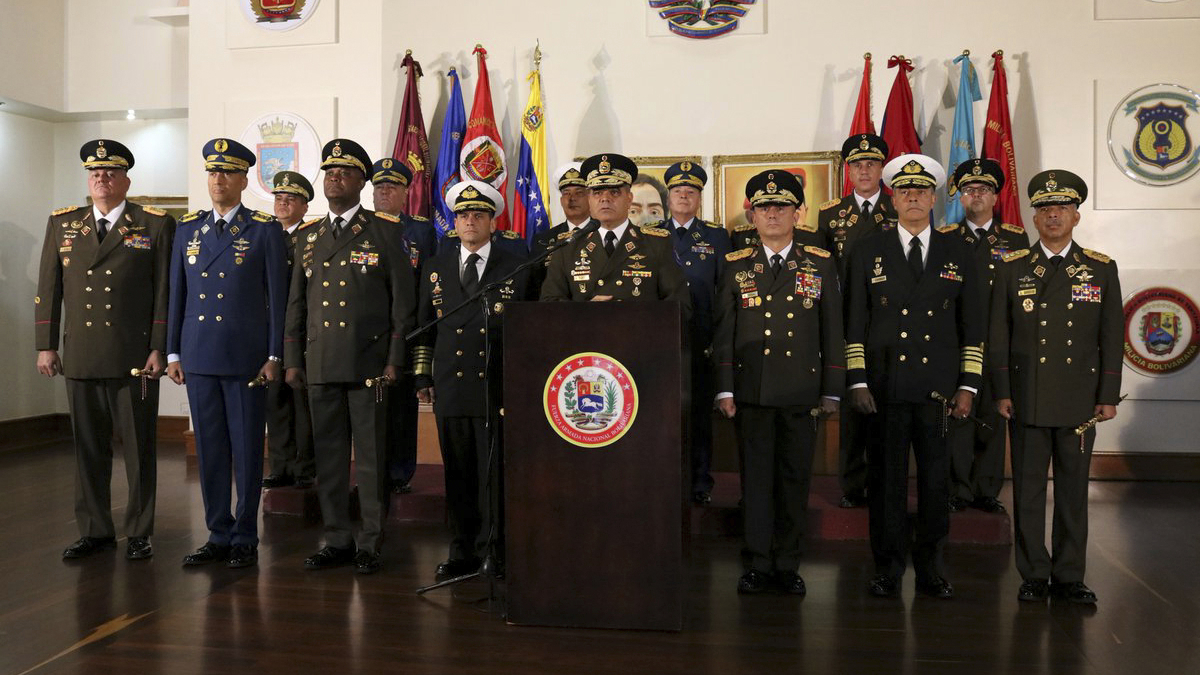In Venezuela’s tense standoff in which two men are claiming to be the legitimate head of state, analysts say that Nicolás Maduro, the nation’s increasingly authoritarian president, holds the upper hand — at least for now — thanks to the support of the armed forces.
On Thursday, Defense Minister Vladimir Padrino López denounced opposition leader Juan Guaidó, who, the day before, had declared himself the country’s president and was recognized by the U.S., the Organization of American States and most Latin American countries.
Guaidó says he wants to form a provisional government that would hold free elections and return Venezuela to democracy. But in a televised speech, Padrino called his oath-taking a “disgraceful” stunt and said Washington was using Guaidó to foment a coup.
And Padrino emphatically stated that the military continues to back Maduro as Venezuela’s “legitimate president” and “our commander in chief.”
Padrino’s speech was a blow to the opposition, which is betting that Guaidó’s dramatic swearing-in ceremony in front of a massive crowd in Caracas coupled with strong support from foreign governments will persuade Venezuelan military officers to break ranks with Maduro.
Maduro is deeply unpopular after leading Venezuela into hyperinflation, food shortages, political repression and a refugee crisis. The current unrest was sparked by his insistence on starting another six-year term on Jan. 10, following a presidential election last year that was widely deemed fraudulent.
Despite some recent defections and arrests in the country’s security forces, analysts who track the Venezuelan military point to numerous factors that are keeping more officers from rebelling.
For one thing, the top brass has been shielded from Venezuela’s economic meltdown because these officers receive numerous perks and have been put in charge of lucrative government operations — everything from arms purchases and steel production to food distribution and the vital oil industry.
Some senior officers have gotten rich off shady deals, including drug trafficking, illegal gold mining, currency scams and contraband smuggling, says R. Evan Ellis, a research professor at the U.S. Army War College who studies Latin American militaries.
U.S. court indictments and targeted sanctions have named several Venezuelans who have served in the South American country’s security forces.
Ellis contends that the fear of arrest or extradition under a Guaidó-led government has persuaded many officers to throw in their lot with Maduro. What’s more, Cuban agents work closely with top Venezuelan officials to snuff out coups before they can be launched.
“My sense is that everyone is paralyzed and thinking that it’s safer to do nothing,” Ellis tells NPR. “Officers have been thoroughly compromised and, with the Cubans watching, there is not fertile soil for a coup to gain critical momentum.”
Bruce Bagley, a professor of international studies at the University of Miami, predicts that “at least through 2019 we are going to see Maduro remain in power backed by the military, which is the crucial element here.”
The military has often served as Venezuela’s ultimate power broker.
In recent decades, it has been involved in coups that have both crushed and restored democratic rule. In fact, Guaidó’s swearing-in ceremony took place Wednesday to mark the anniversary of a civic-military uprising in 1958 that deposed dictator Gen. Marcos Pérez Jiménez.
During the Cold War, the Venezuelan military was a strong U.S. ally and a major client for arms and aircraft, including F-16 fighter jets. But former President Hugo Chávez, a former army paratrooper who first came to prominence after leading a failed coup attempt, began revamping the armed forces after ushering in Venezuela’s socialist revolution in 1999.
Chávez broke with the Pentagon and brought in Cuban military advisers. He based promotions on loyalty to the revolution. And he gave vast new powers to his favorite officers, a trend that has accelerated under Maduro as he tries to keep the military on board amid the deepening crisis.
Addressing troops and officers in a speech on Wednesday, Maduro called for “maximum loyalty.”
Still, there are signs of growing discontent.
Thousands of troops, who earn the equivalent of just a few dollars per month, have deserted, and scores of officers have been arrested on conspiracy charges. On Monday, about two dozen National Guard members raided an arms depot in Caracas and called for a popular uprising before they were arrested.
“Most of these plots have been small because they are easier to hide” from counterintelligence agents, said Harold Trinkunas, a Venezuela expert at Stanford University.
Rather than pushing for a traditional coup, he adds, the opposition is trying to convince officers they should simply keep their troops in the barracks and allow anti-government demonstrations to build until Maduro is forced out.
To convince them, Guaidó is promising to pardon officers who abandon Maduro and back the opposition. Ironically, Ellis says that amnesty could produce a scenario in which corrupt officers who switch sides and help ease out Maduro get to keep their stolen money while portraying themselves as democratic heroes.
But thus far, there have been no reports of any takers. As the impasse drags on, some fear that Maduro could resort to the repressive tactics that he has successfully used before: a military crackdown on protesters and the arrest of opposition leaders.
In an analysis published Thursday, the International Crisis Group warned: “If Maduro retains the armed forces’ support, he will almost certainly seek to stay in power and violently crush those who are challenging him.”
9(MDEwNzczMDA2MDEzNTg3ODA1MTAzZjYxNg004))
